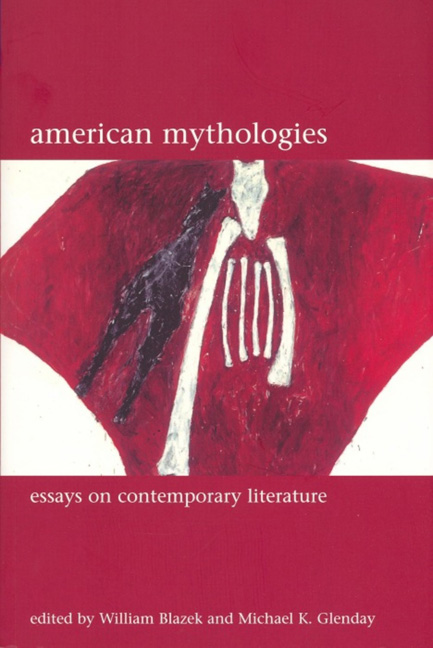Book contents
- Frontmatter
- Dedication
- Contents
- Acknowledgements
- Introduction
- 1 Indians with Voices: Revisiting Savagism and Civilization
- 2 Wild Hope: Love, Money and Mythic Identity in the Novels of Louise Erdrich
- 3 Float Like a Butterfly, Sting Like a Bee: Mythologies of Representation in Selected Writings on Boxing by Norman Mailer
- 4 The Secret Sharing: Myth and Memory in the Writing of Jayne Anne Phillips
- 5 The Individual's Ghost: Towards a New Mythology of the Postmodern
- 6 ‘Cheap, On Sale, American Dream': Contemporary Asian American Women Writers’ Responses to American Success Mythologies
- 7 ‘No Way Back Forever’: American Western Myth in Cormac McCarthy's Border Trilogy
- 8 Native American Visions of Apocalypse: Prophecy and Protest in the Fiction of Leslie Marmon Silko and Gerald Vizenor
- 9 The Brave New World of Computing in Post-war American Science Fiction
- 10 Mythologies of ‘Ecstatic immersion’: America, The Poem and the Ethics of Lyric in Jorie Graham and Lisa Jarnot
- 11 Whose Myth is it Anyway? Coyote in the Poetry of Gary Snyder and Simon J. Ortiz
- 12 Aging, Anxious and Apocalyptic: Baseball's Myths for the Millennium
- 13 Finding a Voice, Telling a Story: Constructing Communal Identity in Contemporary American Women's Writing
- Notes on Contributors
- Index
9 - The Brave New World of Computing in Post-war American Science Fiction
- Frontmatter
- Dedication
- Contents
- Acknowledgements
- Introduction
- 1 Indians with Voices: Revisiting Savagism and Civilization
- 2 Wild Hope: Love, Money and Mythic Identity in the Novels of Louise Erdrich
- 3 Float Like a Butterfly, Sting Like a Bee: Mythologies of Representation in Selected Writings on Boxing by Norman Mailer
- 4 The Secret Sharing: Myth and Memory in the Writing of Jayne Anne Phillips
- 5 The Individual's Ghost: Towards a New Mythology of the Postmodern
- 6 ‘Cheap, On Sale, American Dream': Contemporary Asian American Women Writers’ Responses to American Success Mythologies
- 7 ‘No Way Back Forever’: American Western Myth in Cormac McCarthy's Border Trilogy
- 8 Native American Visions of Apocalypse: Prophecy and Protest in the Fiction of Leslie Marmon Silko and Gerald Vizenor
- 9 The Brave New World of Computing in Post-war American Science Fiction
- 10 Mythologies of ‘Ecstatic immersion’: America, The Poem and the Ethics of Lyric in Jorie Graham and Lisa Jarnot
- 11 Whose Myth is it Anyway? Coyote in the Poetry of Gary Snyder and Simon J. Ortiz
- 12 Aging, Anxious and Apocalyptic: Baseball's Myths for the Millennium
- 13 Finding a Voice, Telling a Story: Constructing Communal Identity in Contemporary American Women's Writing
- Notes on Contributors
- Index
Summary
I
In a pamphlet of 1784 designed for those who were considering emigration to America Benjamin Franklin took obvious pride in declaring that in the new country ‘People do not enquire concerning a Stranger, What IS he? but What can he DO?’ (Franklin's emphasis). Franklin was helping to formulate a national ideology of useful action based on the premise that ‘God Almighty is himself a Mechanic’ (977). ‘Doing’ for Franklin involved the comforting conviction that all problems could be solved through pragmatic improvisation. In his writings the term ‘mechanic’ has entirely positive connotations of individual inventiveness. We might consider this a myth of know-how or the positive myth of the machine as an inexhaustible means of problem-solving, whether it be devising a flexible catheter or a lightning conductor. As Cecelia Tichi shows in her ground-breaking study Shifting Gears (1987), this confidence in mechanical invention had increased in scale by the 1930s when component-part design offered a model for activities as diverse as understanding the workings of the human body, building a bridge, or writing a novel. This mechanistic aesthetic thrived because of the diversity of occasions when it could be applied, because its application was immediately visible, and because it could be practised as early in life as childhood through building blocks.
There is a reverse side to this optimistic belief, a counter-myth of the machine which concentrates on its liabilities and which came increasingly to the fore after the Second World War. D. H. Lawrence, for instance, ridiculed Franklin for anticipating the mass-production methods of Taylorism in desiring a pattern American to emerge; and Aldous Huxley burlesqued the same system of economic production by applying it to human grading in Brave New World (1932). More recently and even more trenchantly Lewis Mumford attacked the ‘anti-human animus of mechanical industry’. His use of the phrase ‘myth of the machine’ denotes a self-mystifying blind faith in technological progress, which blanks out the imperialistic and capitalistic costs of this impulse to conquer Nature.
- Type
- Chapter
- Information
- American MythologiesNew Essays on Contemporary Literature, pp. 168 - 201Publisher: Liverpool University PressPrint publication year: 2005



